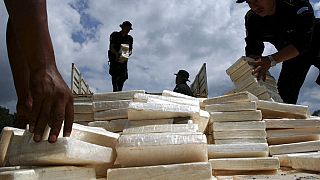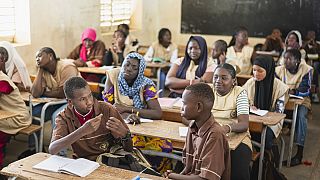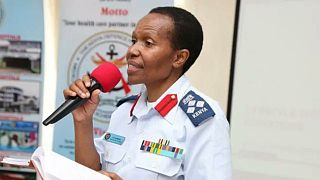Senegal
Senegalese singer-songwriter Baaba Maal releases his first album in seven years, "Being," on March 31st.
"I'm so happy to be able share some piece of music with people and I was looking for that. But I did take my time to make the songs to become reality and to record them like we did, from Senegal to London to New York to - everywhere," Maal told The Associated Press in a recent interview in London.
"After all these years playing music, just talking about the music and also about life; just to let things go by themselves and let the music create itself and to talk about all the issues that I wanted to talk (about) and also to write the songs with my friends, because most of the people who are in this album are friends also."
"Being" is an exploration of Maal's African roots in Senegal amidst a changing, modernizing world with climate change threatening his home. The genre-crossing record showcases traditional African instruments along with futuristic electronic sounds.
The first single from the record was "Yerimayo Celebration," which is a jubilant, rabble-rousing celebration of Maal's roots in the small town of Podor in north Senegal, and the fishing community at its heart. Maal was born into a fisherman caste and was expected to follow that career path, but he befriended griot (traveling storyteller and musician) Mansour Seck, and was welcomed into his family.
"I never thought I would stay in one place and doing one thing every day in my life. This is why music is a really good opportunity for me to go away, first, like a young person, like going on an adventure. It's also to go to perform in front of people but also to take the car, a plane or boat to go somewhere else to meet people, to do something totally different of what I was supposed to be doing there. And it's a way to liberate me and the people of my generation of this caste system where you have to stay in this place, do the same thing like your father or grandfather. We want different things - we are living in a modern way and so I think music, it really helped," he said.
Maal's latest single, "Freak Out," features vocalist Esau Mwamwaya of The Very Best. The video to accompany the track shows scenes from the Blues De Fleuve festival, which Maal founded. It takes place annually in his hometown on the Senegal River, bringing together musicians, artists, singers, activists and more from all over West Africa. Maal calls it "The Glastonbury of Africa." The clip is directed by Oscar-nominated, Emmy-winning American director, cinematographer and film editor David Darg.
The veteran musician is headlining the Barbican for the first time in 20 years on 30th May and the audience can expect a unique experience.
"I love to play at the Royal Festival Hall or the Royal Albert Hall or Glastonbury or WOMAD, but in the Barbican, it's really - for me, it's like the Jazz Café, where we started to play. You know, you see people are just near you - it's like even you can touch their hand and you see their face. It's really intimate for me and I like the ambiance down there at the Barbican. I'm looking forward and the band also looking forward to making a different show, because I like shows to be really different than every time that I come to perform."
"Music is a celebration and music is a party and when it comes to an African party, it has to be an African party," he added.
As well as being a musician, Maal is also an activist on climate change and refugees. Since 2003, he has been committed to various development challenges in Africa, working with different UN family organizations.
His NANN-K Trust recently opened a solar-powered irrigation project in Senegal to fight desertification, which is one of the main drivers of people leaving on dangerous migration routes. The project will train people to start similar schemes in their own communities and Maal is a particular believer in putting power in the hands of young people and women.
"It's never too late to make it happen and this solar irrigation is making a big difference. First thing, we are chanting, we are crying, we are saying loud that we need a green Africa and a clean Africa to make people to live really a normal life, to face climate change, desertification - all of that," he said.
Baaba Maal is the voice of Wakanda for the "Black Panther" movies, and the Senegalese musician believes the franchise can inspire new hope for the African continent.
The movies are set in the fictional African paradise of Wakanda, a country that is rooted in tradition and yet has the most advanced technology in the world. The visionary musician sees a template for Africa in the "Black Panther" films' Afro-futurism.
"The story itself is the story of Africa, Wakanda - people know that it's a utopic Africa and also it's for all the clothing, all the jewelry, all the hairdressing - everything is there, which is representing what I think people are expecting to come from the continent, the African continent," Maal told The Associated Press in a recent interview in London..
"I always say to the young people, you know, I have a feeling... that something great should be coming from this continent again, and something positive for the world. You don't know if it's sport or culture or politics or what. I'm not talking about economy but something great that can be inspiring the world again," he added.
The 69-year-old recording artist worked with director Ryan Coogler, composer Ludwig Göransson and fellow Senegalese musician Massamba Diop to create the score and soundtrack for the hit movies.
To research the music, Göransson headed for West Africa and went on a road trip with Maal around the north of Senegal.
"The first one was a surprise," said Maal, "and I didn't know that it was going to be that big, but my experiences that making the music with Ludwig (Göransson, composer) in Senegal, with all those musicians, without knowing the impact that this movie was going to have in the world."
For a musician who is accustomed to between 20 and 40 people taking part in his music videos, being on set with around 800 cast and crew for the second movie, "Wakanda Forever," was "big." Maal felt it was important to honor the legacy of Chadwick Boseman, who starred in the first "Black Panther" movie before his untimely death in August 2020, aged just 43.
"I think many people accepted to be in the next one because... Ryan Coogler is a great young person in this industry. Ludwig Göransson is a great composer and a friend and someone who respects musicians, but I think most of the people said to themself they did appreciate Chadwick (Boseman) and we miss him. What can we do to celebrate him? If you get the chance to be called to come to participate in 'Wakanda Forever,' everyone say, 'Yes, that's my only way to say to him thank you,'" said Maal.
Maal's participation in Marvel's blockbuster franchise has brought his music to a new, much younger audience.
"I think it's an opportunity that just came to me and Massamba (Diop), the tama drum player," said Maal, who said it is an exciting time for African music in general.
"It all comes together at the right time, because when I look at what Beyoncé is doing... it's like a look to Africa, for example. It's like she looked at the fact that she is, has her origin in Africa, she's Black, you know. And not just her - many other people. But I think what I say to the people in Senegal, I say, 'You see, this is an opportunity. This is a door which is open for Africa, not just for Baaba Maal. It's for the continent,'" he said.
Baaba Maal's new album, "Being," is released on 31st March 2023 by Marathon Artists.











00:41
U.S. court upholds R. Kelly's 20-year prison sentence
02:04
2024 New Orleans Jazz and Heritage Festival kicks off
Go to video
5 African countries with the highest Schengen visa rejection rates
02:20
Jamaican artist Sean Paul prepares to kick off US tour
02:20
Choro, Brazil's first urban popular music genre, gets national recognition
01:14
Senegal: President Diomaye Faye appoints Ousmane Sonko as prime minister